The first page in three months.
Thank you to those who have inquired about my whereabouts and state. As for whereabouts, I have spent much of the past few months in my home-cave on retreat, and as for state, save for a few broken fibers in back of the left knee – the kind of minor injury that impairs mobility (I am reminded of David and Goliath), I am fine.
My retreat from the dialectic of smart phone, email, twitter, instagram, Facebook, along with the cacophony of twenty-four hour news gave way to the silence of unbounded space. In the interlude I took up some of the books that had been gathering dust on my bookshelf while waiting to be read. Settling into an oversized Relax the Back Chair I renewed my friendship with Paul Theroux through Ghost Train to the Eastern Star, Paul Bowles through a collection of travel writings and Robert Thurman (father of Uma) through a book on Tibetan Buddhism
In my silent, capacious space, a trip to a faraway unknown place was the last thing on my mind. Calm abiding, sky gazing, intermittent bouts of meditation were more to the point, but in reading Theroux’ account of his train ride through Eurasia my inner traveler awakened and in the twinkling of a magical moment I was catapulted to Baku.
As my lips gently beeped Ba followed by the soft, forward whistling owl-like ku, I grew mesmerized by the lullaby like quality of the word. I began to repeat the syllables over and over like a mantra. Initially, I had no intentions but to savor the beautiful sound. Still, a word has the power to call forth what it names and as a result of thought and action, Baku manifested.
In truth Baku is no magical being and surely not a mantra, far from it. Rather the wealthy, oil rich capitol of Azerbaijian, it sits in a cove on the coast of the Caspian Sea. The sound of Caspian captivated me almost as much as the sound Baku. It stirred mythical images of handsome swashbucklers joy riding over the sea in luxurious freighters. In the silence of unbounded space my imagination lost all restraint. The Caspian Sea, the largest saltwater body on earth along with Baku had garnered my attention.
Apart from readings of Russian history and literature (who has not read Dostoyevsky?) in my youth and a recent trip to Turkey, I have paid little attention to this part of the world. I have been aware of those times when one or another, Georgia and Kazakhstan included hit the news over political squabbles or issues concerning oil production, but mainly Eurasia remained wrapped in a cloak of mystery. Now, mystery and cloak began to dissolve.
In its present form Baku is a bit of Disneyland, the Middle Ages, the Middle East, and Soviet Modernism over-laid with exotic examples of twenty first century architecture.
In approaching the city from the air the Flame Towers claim one’s attention. Positioned on a hill overlooking the amphitheater shape of the city, three flame-like licks, reminiscent of playful fire goddesses oversee the city. The design of the towers originating in ancient rituals of fire worship, their pragmatic purpose is residential, hotel and office space. The trinity defines the skyline as it speaks to the historic identity of the city.
As my astral vehicle hyper-looped toward Baku my excitement mounted. It was spring equinox the first day of an annual tridium of celebration known as Novruz Bayram (Farsi for new day). Mr. Theroux and I arrived on the same day although several years apart. It is to him that I credit my newfound fascination with Baku.
Hotels were booked. Indeed, it is necessary plan ahead in order to find lodging for this holiday, but in my case I had no worry. Why with my unique mode of travel I was hardly in need of a room.
In the book mentioned above Theroux explains that “militant Islam” is said to have ended in one-way or another the ancient rituals in countries in which they took hold. But, he says, “Novruz Bayram was proof that some of the old rituals persisted in spite of being heresies.” An ancient Zoroastrian celebration, it is one of the oldest holidays on earth. I would discover that the way the Azeri’s prepare Novruz Bayram is similar to the way Christians prepare for Easter: spring cleaning, new outfits, seeding the garden with flowers, decorated eggs, and raising their smiling faces to the new sun as it enlightens the diminishing dark clouds of winter.
As I approached old town I could hear the sounds of music and laughter. The celebration in full swing, flocks of tasseled musicians played for the crowds, men and women danced in the streets while children chased one another in circles. Here and there a mime or two. I wondered if they had wondered in from the west?
Hungry after my journey half way around the world I headed for a street vendor busy making shishlik over open coals. My inner vegetarian was happy that he barbecued tomatoes, aubergines and peppers in addition to the lamb and sturgeon although I have heard that the sturgeon out of the Caspian is the best! I pointed to a veggie shish and he in turn sprinkled it with sumac and put it on a plate. Spooning a bit of saffron infused pilaf on to the plate he turned both over to me big smile included. Then, on what appeared to be a second thought, he laid a thin crescent shaped kuba on my plate as well. I thanked him in English. He seemed to understand.
With my plate in hand I continued on up the cobblestone path through old town. I passed several restaurants sporting special holiday menus with most listing traditional Azeri food: classic mutton pie, noodles and potato cakes. Aroma from stacks of freshly baked teneri on a table outside a bakery filled the air.
I found a small deserted park with benches. I sat down and began to enjoy my meal. A few pigeon-like birds landed at my feet. Cocking their necks to and fro cautiously observing me I knew they were inauspiciously begging. I hesitated to feed them.
Down a side alley to my left I could see a lamb penned up in the entry to a small apartment. It’s bleating had a kind of forlorn quality, a sort of forced wailing that led me to assume that the poor lamb knew that its destiny to provide food for the family was about to be met.
I was reminded of a friend back home who raises a cow every year for the same purpose. By raising it on her own back forty she is assured of having grass-fed, humanely raised and slaughtered beef. I concluded that raising one’s own meat in the heart of this million plus city must be acceptable.
I sat for a long time or so it seemed, taking in the bright sun, slowly savoring my food, listening to the music, and observing the people. I was a long from home, in a foreign place, I knew nary a word of Azeri, but I felt comfortable and content. After awhile an elderly woman came out of the bakery next to the park. After observing me she went back inside the bakery then reappeared with a piece of teneri. She came over and offered me the bread. It was still warm from the oven. She did not speak English, but we laughed, bowed, nodded toward one another, I rubbed my tummy, and did a thumb’s up. She followed with a goodbye wave then returned to the bakery.
Slowing chewing on my bread I returned to my reverie. I felt I could sit there all day observing the playful Azeri’s and soaking in the spring sun. They seemed such a warm people. A dozen or so stray cats paraded by, wavy tails high in the air. The lamb quieted down a bit, stopped bleating when his master brought him some food. I knew I had to get on. With my trip so unexpected, I had made almost no preparations. I would turn myself over to my inner guide.
I was vaguely aware that Baku had its share of World Heritage sites. Some of my friends back home would not understand if I bypassed the sites. I forced myself up from the bench and made my way out of the little park. I would hyper-loop to those sites, but first my sweet tooth calling I decided to search out the Bisque Café. I remembered an article I had read sometime back by Aida Mamudova the founder of the Yarat Contemporary Art Foundation. My interest was in the art, but she had written her article for a travel guide in which she claimed that the Bisque had the best ice cream in Baku. Good for people watching as well.
I managed to find the café. Without Google maps my old sense of intuitive direction seem to come back. A young Azeri woman greeted me with a smile, I found myself beginning to expect smiles, offered several tastes of ice cream. So-so in my estimation, but with her generosity I felt compelled to order a full cone. I had no other Azeri ice cream with which to compare, but if this were the best, I would wait until I got back to California for more.
Tall three scoop cone in hand, I resumed my walk toward the historic sites. I have to admit there are times when I am bored by the smells of antiquity I frequently encounter as I waddle through old museums and ancient sites. However, when I arrived at Shirvanshah’s Palace ensorcelled with its magnificent complex of structures including a mosque mausoleum, burial-vault and divan-khans, memories of a glorious past life rekindled. I paid little attention to the historical footnotes placed here and there. Instead, I soaked up the energy. Ancient, I let it play a bit with my mind and body.
Not too long though as I had so little time and I needed to make some hard choices between visiting an abundance of history and art museums or the sacred sites. I had hoped to see Zaha Hadid’s new architectural structure as well. Having grown accustomed to long draughts of quiet in my home-cave, I began to feel weary of the crowds and noise. Fatigue played into my decision.
The mythologies and rituals we create in our search for meaning and understanding as they took form in the ancient spiritual traditions, whether those that developed into major world religions, or the more occult hidden, esoteric gems, have always called to me. I could see that with its abundance of mosques, churches and synagogues Baku had much to offer in this regard. With its apparent acceptance of religious plurality I felt it must be a tolerant place. I decided to look more into this when I returned home and had my Internet library at my fingertips. Finally, with a need for quiet I decided to head for Atesgah the place where Zoroastrians had worshiped for centuries.
Atesgah was approximately thirty kilometers away, but I managed to motivate my way to it. When I arrived signs signaled (I had to intuit here) that I was in the “land of sacred fires” for which Azerbaijan has been known for thousands of years. With gas and oil deposits continually erupting the early travelers called it the land of everlasting fire. The founder of Zoroastrianism used fire as a metaphor. He too must have witnessed the spontaneous flames rising from the natural gas outlets around the countryside.
I found the history a bit complex and shrouded, but as much as I could decipher, Atesgah had a long history of fire worshippers even before Zoroastrians used it for worship. The present day temple goes back to the 19th century. While the natural gas ceased long ceased burning, artificial fires have been installed.
Zoroastrianism was barely covered in a course on traditions of the world when I prepared for my degree in Consciousness Studies. Perhaps I am ignorant with my superficial smattering of its rules and regulations, but I am impressed that good thoughts, words and deeds, and understanding the purifying nature of fire, both key to the tradition are so important. Simple. Do need look any further in our mundane application of spirituality?
I was a bit disappointed that the temple fires are artificial. Still, I made my offerings of sage and incense to the gods and goddesses of fire before I left. It seemed appropriate to include offerings to Kali as historically Zoroastrianism has made its way back and for to India. Before leaving I found another bench and sat a bit, taking it all in. I was a stranger in a strange land, but again I felt comfortable and at home.
Over my few hours of moving about Baku it became clear to me that as is true of so many global cities, signs of gentrification are ubiquitous. Renovation on the rise, the old is coming down. As I had moved about dust from the pillaging work of large hydraulic equipment hung heavy in the air. Cats ran freely through forsaken home sites waiting to be destroyed. I saw the elderly hobbling along insecurely through the same while the blue-jeaned, young confidently foraged forward laughing and joking with their comrades. Baku had changed, was changing right before my eyes but signs of history, magnificent structures, and culture remained. I sat there taking it all in. I realized that I had been stretched, my universe expanded. Grateful, I thanked unbounded space for what it opened to me.
My thoughts turned to return. The thing about a hyper-looped, astral trip is that coming back is as easy as going. A closing of the eyes, an intention, and ploof, one arrives at the intended destination. Outside of time and space I returned as quickly as I had gone.
A bit of important data: if you decide to visit Baku, the weather in July through Oct is warm. January through June dry, November wet. December-January, cold.
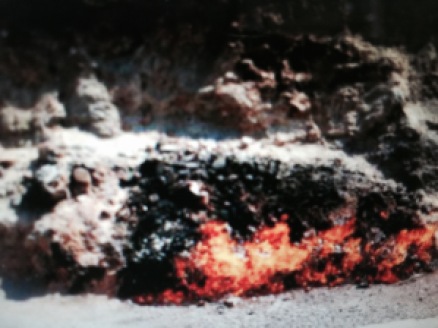
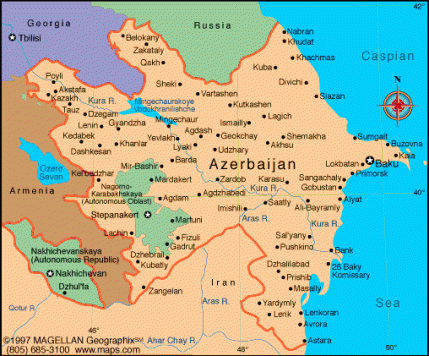
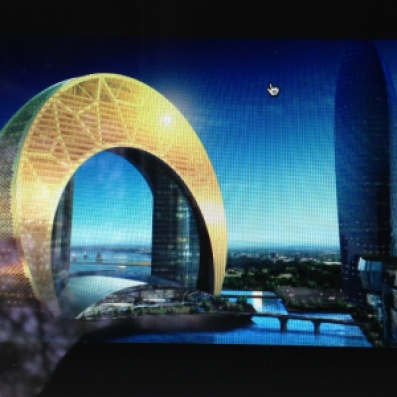
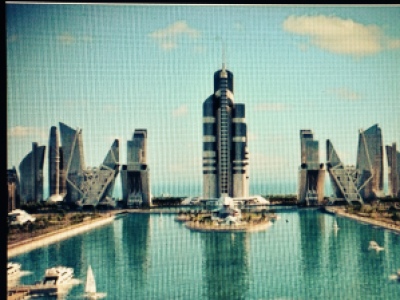



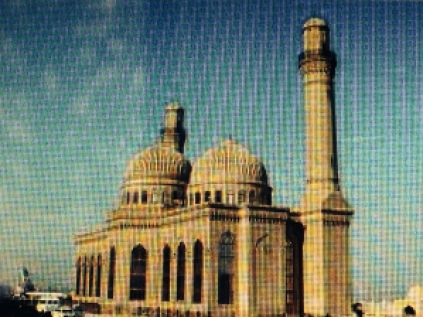

Leave a Reply